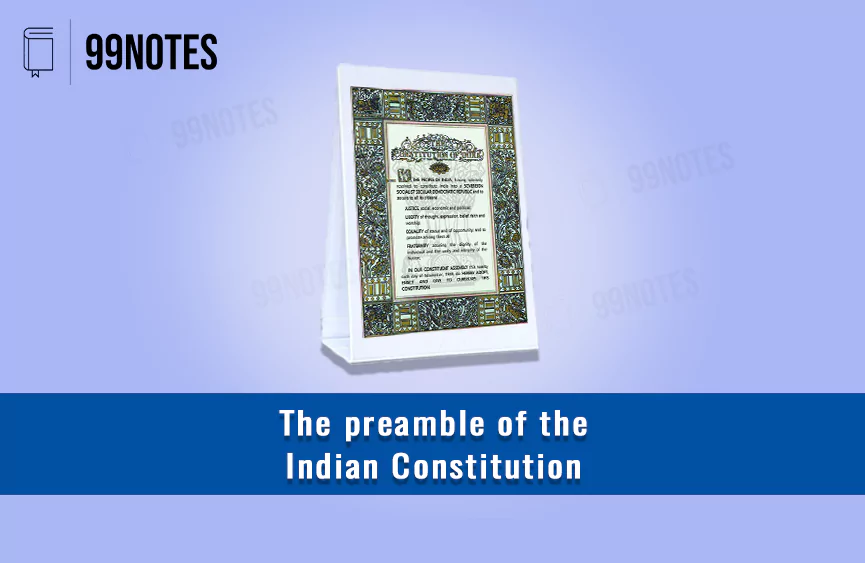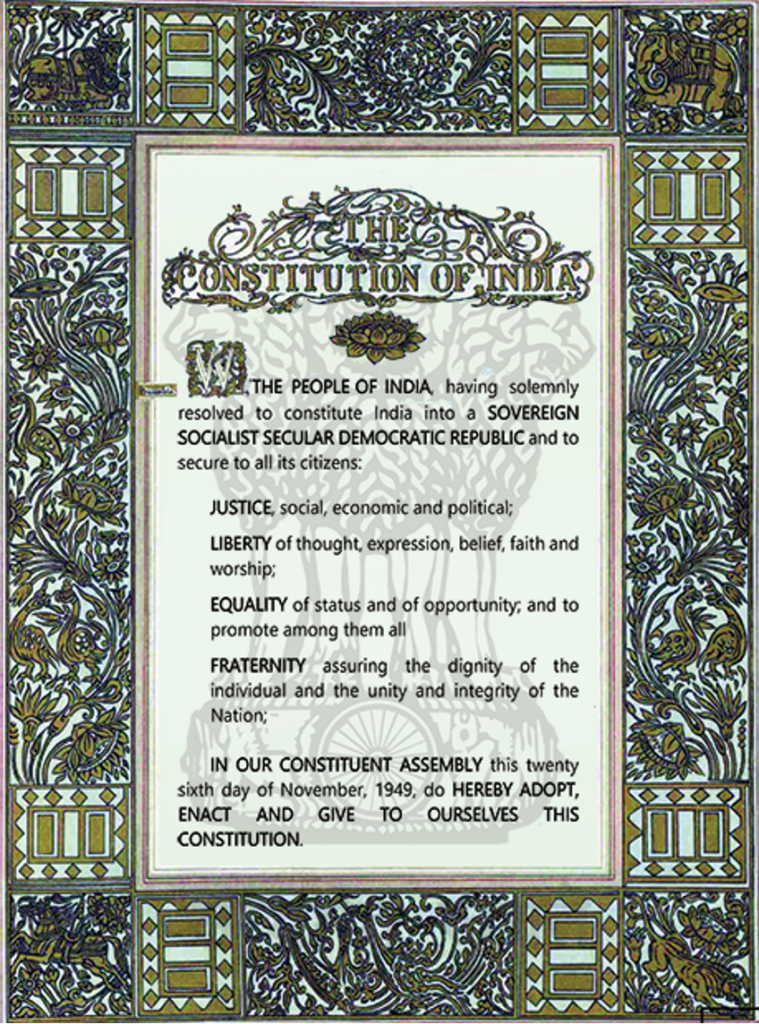The Preamble of the Indian Constitution Notes Summary UPSC

The Preamble of the Indian Constitution is a brief introductory statement that outlines the fundamental principles and objectives of the Constitution. Therefore, Eminent Jurist Nani Palkhiwala called Preamble as “Identity Card of the Constitution”.
The Preamble’s function is to define who the Constitution is for, the sanction, the direction, the character of policy, and the Constitution’s goals and objectives.
It has been rightly called the “Horoscope of the Constitution” by KM Munshi, as it tells us about how the Indian state would be after its independence.

It reads as follows:
Unlike the constitutions of Australia, the United States, and Canada, India’s Constitution features a lengthy Preamble. Many constitutions over the world begin with a preamble to them to give an idea about the nature of polity in the country.

Historical Background of Preamble of Indian Constitution
Objective resolution
- The Preamble to the Indian Constitution is primarily based on the Objective Resolution written by Jawaharlal Nehru. He introduced this objective resolution on December 13, 1946, and the Constituent Assembly adopted it on January 22, 1947.
- The objective resolution was a pledge, an undertaking and a firm resolve that guided the constituent assembly for three years till the constitution was made.
- Initially, the Preamble was drafted by Sh. B. N. Rau in his memorandum of May 30, 1947, and was later reproduced in the Draft of October 7, 1947. In the context of the deliberations by the Constituent Assembly, the Preamble was reformulated.
- It was adopted on 26 November 1949, and implemented on January 26, 1950, also known as Republic Day.
In forming the Preamble based on Objective Resolution, the Drafting Committee felt that the Preamble should only deal with the basic features of the State and its objectives. The Committee has mentioned the words Sovereign, Democratic, and Republic Purpose.
The need for the Preamble
The main reasons for having a preamble in the Indian constitution are:
- The Preamble begins the Constitution. The Preamble can also be called the soul of the Constitution as it has everything about it.
- Summarizes the fundamental Ideas: Indian Constitution is the lengthiest written Constitution in the world, with approximately 450 Articles and 12 Schedules. The Constitution’s Preamble defines the document’s fundamental ideas and philosophy and the policy aims and objectives that the Constitution’s founding authors strived for
- Judicial value: In several decisions, the Supreme Court of India has stressed the relevance and value of the Preamble. It assists the Supreme Court in deciding whether a specific law or piece of legislation is in accordance with the Constitution.
- It incorporates all of the beliefs and aspirations for which the country struggled throughout the British Regime. The Constitution’s objective is to bring justice, liberty, equality, and fraternity to its citizens. It declares the enormous rights and liberties that Indian citizens have as citizens of this country.
- Guide to the Legislative & Executive: It is a type of statute primer, and it helps figure out the policy and legislative purposes. It communicates ‘for a long time what we had been contemplating or dreaming about.’
- It enacts the constitution: The enacting clause, which puts the Constitution into effect, is also found in the Preamble.
- It declares people of India as the source of the Constitution.
Key Concepts of the Preamble of the Indian Constitution:
Multiple keywords are inscribed in the Preamble of the Indian Constitution, such as sovereign, socialist, secular, democratic, republic, justice, liberty, equality, and fraternity, which indicate the character of the State and its goals. The Indian Constitution’s Preamble is considered the soul of our Constitution.
Sovereign
- It implies that the Indian state has the sole authority to make judgments about both internal and external issues.
- No foreign power can impose its will on the Indian government.
- It signifies that India is a sovereign nation, not a colony or a reliance on another country.
- It means that India is a supreme power, and no internal or external forces can challenge the authority of the Indian government.
- As a sovereign state, India is immune to foreign meddling in its domestic affairs.
Socialism
- Socialism is a social system in which everyone in the community has an equal part in resource creation, distribution, and trade.
- A democratic style of governance allows for this type of ownership.
- A cooperative system, in which each community member owns a portion of communal resources, has also been used to demonstrate socialism.
- The word Socialist was added to the Preamble by the 42 nd Constitutional Amendment,1976.
- There are several benefits and drawbacks to socialism.
Secularism
- The Indian Constitution embodies the optimistic notion of secularism, which states that all religions in our country (regardless of their strength) enjoy the same status and support from the government.
- It emphasizes India’s constitutional secularism and lack of an official religion.
- And that the State must respect and embrace all religions rather than favour or patronize any one of them.
- The term Secular was added to the Preamble by the 42 nd Constitutional Amendment, 1976.
Democracy
- As stated in the Preamble, a democratic polity is introduced on the doctrine of popular sovereignty, or the people’s possession of supreme power.
- The Indian Constitution establishes a representative parliamentary democracy in which the executive is accountable to the legislature for all policies and actions.
- The universal adult franchise, periodic elections, the rule of law, the independence of the judiciary, and the absence of discrimination on specific grounds are manifestations of the Indian polity’s democratic character.
- In the Preamble, the term “democratic” is used broadly, encompassing not only political democracy but also social and economic democracy. Dr Ambedkar stressed this dimension in his conclusive speech on 25 November 1949 in the Constituent Assembly.
Republic
- A democratic polity is divided into two types: monarchy and republic.
- In a monarchy, the head of State (usually the king or queen) has a hereditary position, which means he is elected through succession, as in Britain.
- In a republic, on the other hand, the head of State is always elected directly or indirectly for a fixed period, as in the United States.
- As a result, the term ‘republic’ in our Preamble denotes that India has an elected head known as the president. He is elected indirectly for a fixed term of five-year He can also be removed from office by Impeachment.
- A republic also means two things: first, that political sovereignty is vested in the people rather than a single individual like a king, and second, that there is no privileged class, so all public offices are open to all citizens without discrimination.
Justice
- Social, economic, and political justice are all mentioned in the Preamble.
- Justice has a broader meaning than merely the legal sense. The word social and ‘economic’ appear before the phrase ‘political,’ which is significant.
- Discrimination based on birth, caste, colour, sex, or religion should be abolished in the name of social justice.
- To that aim, all citizens should have equitable access to public appointment possibilities.
- The government must strive for the common good of all citizens.
- The Directive Principles’ concept of a welfare state embodies instructions for attaining the social justice envisioned in the Preamble.
- The idea has been taken from the Russian Revolution (1917).
Liberty
- Democracy is closely connected with liberty; every community member must enjoy certain minimal rights for a free and civilized existence.
- The Preamble defines these fundamental rights as freedom of thinking, expression, belief, faith, and worship.
- This freedom is guaranteed explicitly in the chapter on Fundamental Rights, subject to some restrictions; after all, if democracy is to exist, liberty must not devolve into a licence.
- The ideals have been taken from the French Revolution (1789–1799).
Equality
- Rights are only meaningful if they are shared equally by all members of society.
- Social and economic equality must be established to guarantee that everyone can benefit from these rights.
- The Preamble secures equality of status and opportunity for all citizens of India.
- It embraces three dimensions of equality–civic, political and economic.
- The Fundamental Rights forbid the State from discriminating between citizens solely based on caste, race, sex, or religion.
- All citizens have access to public spaces, titles of honors have been abolished, and untouchability has been eliminated, among other things.
Fraternity
- This refers to a sense of brotherhood and sisterhood among its citizens and a sense of belonging to the country.
- According to the Preamble, the fraternity must ensure human dignity and national unity and integrity.
- It aims to overcome hurdles like communalism, regionalism, casteism, linguism, secessionism, and so on, which threaten national integration.
- The 42nd Constitutional Amendment (1976) adds the word ‘integrity’ to the Preamble.

Preamble’s relation with the Constitution
Is the Preamble a part of the Indian Constitution? This has been a big legal debate in India.
- In the AK Gopalan case (1950), the Supreme Court held that the Preamble was not enforceable as it wasn’t considered part of the Indian Constitution.
- In the Berubari Union case (1960),the Supreme Court said that in several instances, the terms used in any articles of the Constitution are ambiguous. Therefore, Preamble can be helpful in understanding what the Constitution makers actually meant while writing the Constitution. However, it did not declare it as a part of the Constitution, despite pointing out its significance in understanding the Constitution.
- However, in the Kesavananda Bharati case (1973), the Supreme Court observed that the Preamble and the Constitution should be read and interpreted in the light of the grand and noble vision expressed in the Preamble. It was declared a part of the Constitution.
- Further, in the LIC of India case (1995), the Supreme Court again held that the Preamble is an integral part of the Constitution.
However, two things should be noted:
- The Preamble is non-justiciable, i.e. its provisions are not enforceable in courts of law.
- It isneither a source of power to the legislature nor a prohibition upon the powers of the legislature.
AMENDABILITY OF THE PREAMBLE
Another big legal question is whether the Preamble is amendable, given that it non-justifiable. The Supreme court has given two interpretation in this matter.
- Berubari Union case of 1960 –The Supreme Court held that the despite being the key to the minds of the Constitution maker, the Preamble is not a part of the Constitution. And therefore, it cannot be amended.
- Kesavananda Bharati case of 1973– Supreme Court rejected the earlier judgement in the Berubari Case and held that the Preamble is a part of the Constitution and can be amended.
The Preamble was amended only once in 1976 by the 42nd Constitutional Amendment Act, adding three new words–Socialist, Secular and Integrity.





